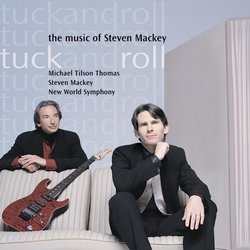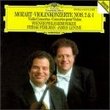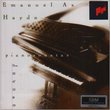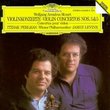| All Artists: Steven Mackey, Michael Tilson Thomas, New World Symphony Title: Tuck and Roll: The Music of Steven Mackey Members Wishing: 0 Total Copies: 0 Label: RCA Release Date: 9/11/2001 Genre: Classical Styles: Forms & Genres, Concertos, Symphonies Number of Discs: 1 SwapaCD Credits: 1 UPC: 090266382620 |
Search - Steven Mackey, Michael Tilson Thomas, New World Symphony :: Tuck and Roll: The Music of Steven Mackey
 | Steven Mackey, Michael Tilson Thomas, New World Symphony Tuck and Roll: The Music of Steven Mackey Genre: Classical
|
Larger Image |
CD DetailsSimilar CDsSimilarly Requested CDs |
CD ReviewsDisappointing Etienne ROLLAND-PIEGUE | 02/19/2002 (2 out of 5 stars) "The guitar concerto has its moments, and they are very reminiscent of something else--I think "Future Legend" from David Bowie's "Diamond Dogs", oddly enough--, but otherwise it is cartoonish and eventually tiresome. My main objection, however, is that the guitar is jangly, pinched, and nasal sounding throughout. The orchestration is over-wrought--too much doubling, too much percussion. The second selection is a sophomoric pastiche of various incongruous famous themes." Weird, But With a Sense of Humor Etienne ROLLAND-PIEGUE | Tokyo, Japan | 03/05/2006 (4 out of 5 stars) "Q: How do you get an electric guitarist to stop playing?
A: Put some sheet music in front of him. Steven Mackey proves this old saw wrong. The electric guitar is emblematic to his music, as the organ is to Olivier Messiaen or the shakuhachi is to Toru Takemitsu. Not that the instrument features in all pieces on this album: in fact, only Tuck and Roll is a concerto written for and around the electric guitar. But all of Steven Mackey's music is influenced by his relationship to the electric guitar and by the mindset that goes with it, even when it is written for other instruments. What is specific about the electric guitar is not that its player doesn't have to read scores. Actually, the interpreter will have to be musically articulate if he is to play on Mackey's compositions, which are well-thought pieces that use the classical orchestra to its full potential. Playing along classical instruments requires a listening quality and an alertness to melodic variations which are very different from the skills honed in a rock band, where it is all about keeping the beat. But the spirit of the instrument somehow remains. Playing the electric guitar involves an affinity to rhythm and a way to strike a note that is very different from other instruments. Even the classical guitar, still that oddpiece in classical music formations, requires a very different technique and produces a radically distinct atmosphere. The essence of the electric guitar can be summed up by the very term that Steven Mackey uses to define his music: "wacky," or weird, but with a sense of humor. It is self-absorbed and does not pay much attention to what goes on around it. It finds newness through repetition, and can revisit the same passage over and again in order to strike the right chord. In the absence of the drums, its disciplining device, it can really go mad and lose all sense of proportion in its exploration of musical boundaries. But its engrossing quality sometimes yields way to a strange modesty, as if the guitarist were conscious of his precarious status in a formation that maintains him at the outskirt of its script. The guitar's coruscating humor can then be turned against itself, in a self-deprecating mode. Mackey's wackiness finds ways in its scores or its performances in expressions that test the limits of the classical establishment. Maverick interpreters and crossover artists have accustomed us to unbridled displays of originality, so the appearance of the guitarist dressed in black leather and donning a red instrument has lost much of its potential to provoke and to unsettle. But the appearance on the stage of a pizza delivery man during the performance of Eating Greens, that has a pizza delivered to the principal bass, never fails to elicit strong reactions, mostly favorable, as if the audience felt the urge to be reminded of the artificial nature of the show. Erkki-Sven Tuur is another composer who also wrote for the electric guitar and whose work I highly recommend." |

 Track Listings (12) - Disc #1
Track Listings (12) - Disc #1










